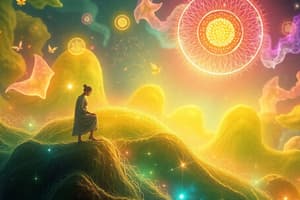Podcast
Questions and Answers
What is biology?
What is biology?
the study of life
What is the basic unit of life?
What is the basic unit of life?
cells
What are the five characteristics of life?
What are the five characteristics of life?
organized, requires energy, maintains homeostasis, reproduces, grows, and develops, evolves
How is life organized?
How is life organized?
Arrange the words from smallest to largest: _____
Arrange the words from smallest to largest: _____
What are emergent properties?
What are emergent properties?
What is metabolism?
What is metabolism?
What does autotroph mean?
What does autotroph mean?
What are producers?
What are producers?
What is another term for producer?
What is another term for producer?
What does heterotroph mean?
What does heterotroph mean?
What are consumers?
What are consumers?
What is another word for consumer?
What is another word for consumer?
What are decomposers?
What are decomposers?
Are decomposers a type of consumer?
Are decomposers a type of consumer?
What is internal constancy?
What is internal constancy?
List eight things your body is maintaining right now.
List eight things your body is maintaining right now.
What are the two modes of reproduction?
What are the two modes of reproduction?
Define sexual reproduction.
Define sexual reproduction.
Define asexual reproduction.
Define asexual reproduction.
Give two examples of asexual reproduction.
Give two examples of asexual reproduction.
What is development?
What is development?
What is evolution?
What is evolution?
Evolution happens over many generations.
Evolution happens over many generations.
Does evolution happen to individuals?
Does evolution happen to individuals?
What is the main cause of evolution?
What is the main cause of evolution?
What is the quote from Theodosius Dobzhansky?
What is the quote from Theodosius Dobzhansky?
Flashcards are hidden until you start studying
Study Notes
Biology Overview
- Biology is defined as the study of life and encompasses a wide array of topics related to living organisms.
Basic Unit of Life
- Cells are recognized as the fundamental units constituting all living organisms.
Characteristics of Life
- Five key characteristics define life:
- Organized structure
- Requirement for energy
- Maintenance of homeostasis
- Ability to reproduce, grow, and develop
- Capacity to evolve over time
Hierarchical Organization of Life
- Life is structured in a hierarchical manner similar to an address, allowing understanding of complex relationships among living things.
Levels of Biological Organization
- From smallest to largest: atom, molecule, organelle, cell, tissue, organ, organ system, organism, population, community, ecosystem, biosphere.
Emergent Properties
- New complex properties that arise at higher levels of biological organization, demonstrating that a system is greater than the sum of its parts.
Metabolism
- Metabolism refers to the chemical processes that sustain life through energy conversion and utilization.
Autotrophs and Producers
- Autotrophs, or self-feeders, produce their own food using sunlight (producers).
Heterotrophs and Consumers
- Heterotrophs, known as other feeders, rely on intake of pre-made food and include consumers and decomposers.
Decomposers
- These heterotrophs derive energy and nutrients from waste and dead organic matter, playing a key role in ecosystems.
Homeostasis
- Homeostasis, or internal constancy, involves regulatory mechanisms that maintain stable conditions within organisms.
Examples of Homeostasis
- The human body continuously manages several factors, including temperature, oxygen levels, carbon dioxide, hormones, sugar, salt, urea, and water.
Modes of Reproduction
- Sexual reproduction involves the union of sperm and egg to form a zygote, while asexual reproduction occurs without such involvement.
Asexual Reproduction Examples
- Common methods include mitosis and cloning, enabling organisms to reproduce without gametes.
Development and Evolution
- Development refers to growth in multicellular organisms, while evolution signifies genetic changes in populations over time, primarily driven by natural selection.
Evolutionary Principles
- Evolution occurs over many generations and pertains to populations, not individuals. The main driving force behind evolution is natural selection.
Theodosius Dobzhansky's Insight
- His famous quote underscores the importance of evolution in understanding biological concepts: "Nothing in biology makes sense, except in the light of evolution."
Studying That Suits You
Use AI to generate personalized quizzes and flashcards to suit your learning preferences.




